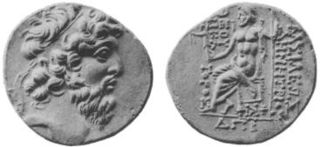
Alexander I Theopator Euergetes, surnamed Balas, was the ruler of the Seleucid Empire from 150 BC to August 145 BC. Picked from obscurity and supported by the neighboring Roman-allied Kingdom of Pergamon, Alexander landed in Phoenicia in 152 BC and started a civil war against Seleucid King Demetrius I Soter. Backed by mercenaries and factions of the Seleucid Empire unhappy with the existing government, he defeated Demetrius and took the crown in 150 BC. He married the princess Cleopatra Thea to seal an alliance with the neighboring Ptolemaic kingdom. His reign saw the steady retreat of the Seleucid Empire's eastern border, with important eastern satrapies such as Media being lost to the nascent Parthian Empire. In 147 BC, Demetrius II Nicator, the young son of Demetrius I, began a campaign to overthrow Balas, and civil war resumed. Alexander's ally, Ptolemaic king Ptolemy VI Philometor, moved troops into Coele-Syria to support Alexander, but then switched sides and threw his support behind Demetrius II. At the Battle of the Oenoparus River in Syria, he was defeated by Ptolemy VI and he died shortly afterward.

The 2nd century BC started the first day of 200 BC and ended the last day of 101 BC. It is considered part of the Classical era, although depending on the region being studied, other terms may be more suitable. It is also considered to be the end of the Axial Age. In the context of the Eastern Mediterranean, it is the mid-point of the Hellenistic period.
This article concerns the period 139 BC – 130 BC.
This article concerns the period 149 BC – 140 BC.
This article concerns the period 159 BC – 150 BC.
This article concerns the period 179 BC – 170 BC.
This article concerns the period 189 BC – 180 BC.
Year 153 BC was a year of the pre-Julian Roman calendar. At the time it was known as the Year of the Consulship of Nobilior and Luscus. The denomination 153 BC for this year has been used since the early medieval period, when the Anno Domini calendar era became the prevalent method in Europe for naming years.
Year 154 BC was a year of the pre-Julian Roman calendar. At the time it was known as the Year of the Consulship of Opimius and Albinus/Glabrio. The denomination 154 BC for this year has been used since the early medieval period, when the Anno Domini calendar era became the prevalent method in Europe for naming years.

Demetrius I, surnamed Soter, reigned as king (basileus) of the Hellenistic Seleucid Empire from November 162 to June 150 BC. Demetrius grew up in Rome as a hostage, but returned to Greek Syria and overthrew his young cousin Antiochus V Eupator and regent Lysias. Demetrius took control during a turbulent time of the Empire, and spent much of his time fighting off revolts and challenges to his power from threats such as Timarchus and Alexander Balas.
Epiphanes, meaning "God Manifest" or "the Glorious/Illustrious", is an ancient Greek epithet borne by several Hellenistic rulers:

Attalus II Philadelphus was a ruler of the Attalid kingdom of Pergamon and the founder of the city of Attalia (Antalya).

The Syrian Wars were a series of six wars between the Seleucid Empire and the Ptolemaic Kingdom of Egypt, successor states to Alexander the Great's empire, during the 3rd and 2nd centuries BC over the region then called Coele-Syria, one of the few avenues into Egypt. These conflicts drained the material and manpower of both parties and led to their eventual destruction and conquest by Rome and Parthia. They are briefly mentioned in the biblical Books of the Maccabees.
Euergetes, meaning "the Benefactor", was an epithet, an honoring title, given to various benefactors. Euergetism was the practice of high-status and wealthy individuals distributing part of their wealth to the community. For example,
Philadelphus is the scientific name of mock-oranges, a genus of shrubs.

The Kingdom of Bithynia was a Hellenistic kingdom centred in the historical region of Bithynia, which seems to have been established in the fourth century BC. In the midst of the Wars of the Diadochi, Zipoites assumed the title of king (basileus) in 297 BC. His son and successor, Nicomedes I, founded Nicomedia, which soon rose to great prosperity. During his long reign, as well as those of his successors, Prusias I, Prusias II and Nicomedes II, the Kingdom of Bithynia prospered and Hellenised, and had a considerable standing and influence among the minor monarchies of Anatolia. But the last king, Nicomedes IV, was unable to maintain himself in power against Mithridates VI of Pontus. After being restored to his throne by the Roman Senate, he bequeathed his kingdom through his will to the Roman republic in 74 BC and it became the province of Bithynia et Pontus in 63 BC.
Philopator, meaning "father-loving", was a common royal epithet among Hellenistic monarchs:

The Seleucid Dynastic Wars were a series of wars of succession that were fought between competing branches of the Seleucid royal household for control of the Seleucid Empire. Beginning as a by-product of several succession crises that arose from the reigns of Seleucus IV Philopator and his brother Antiochus IV Epiphanes in the 170s and 160s, the wars typified the final years of the empire and were an important cause of its decline as a major power in the Near East and Hellenistic world. The last war ended with the collapse of the kingdom and its annexation by the Roman Republic in 63 BC.






